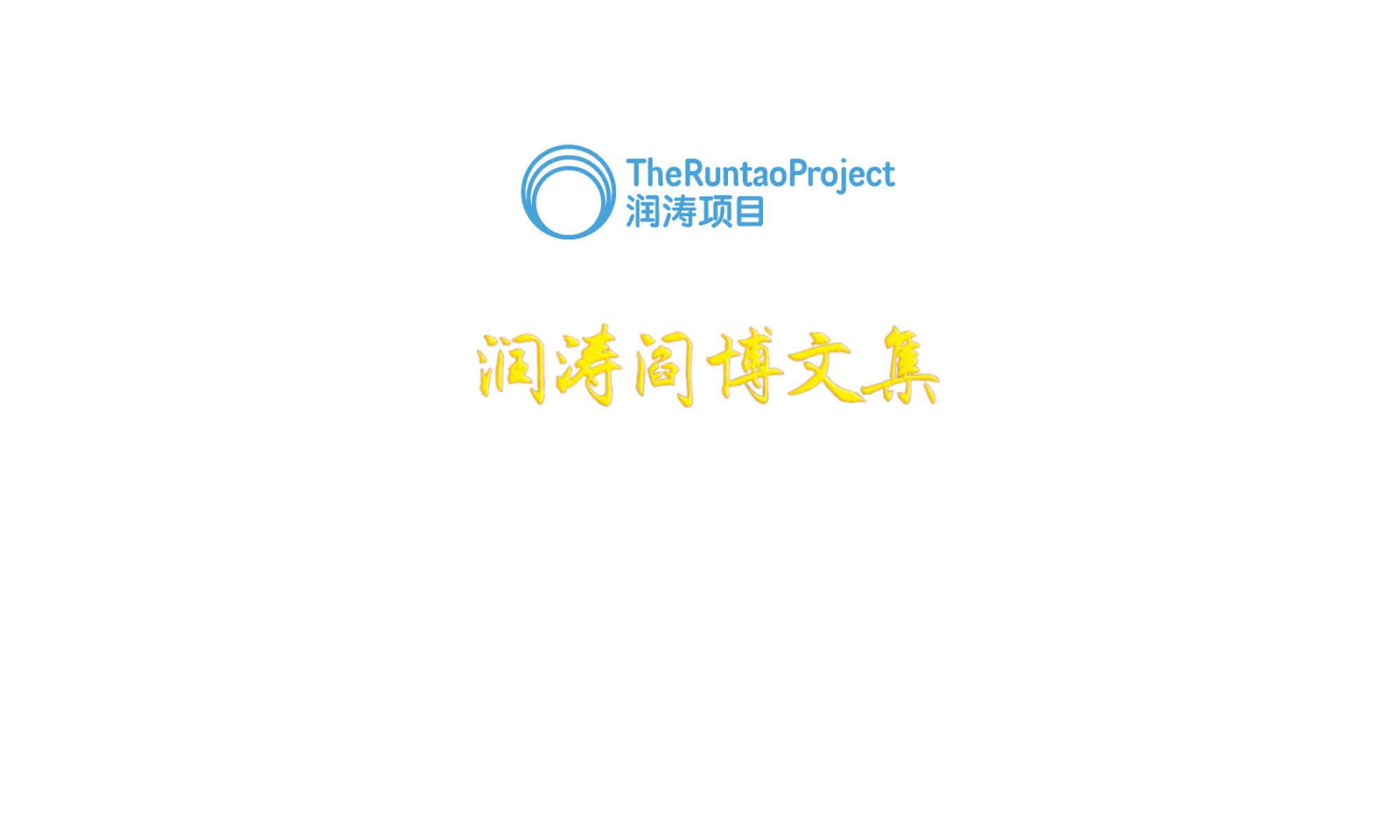Views: 858
阎友们,
大家好。近些年不少拥有百万千万粉丝的娱乐明星、体育明星、甚至商界名人纷纷跌下神坛,在网络上被封杀及禁言。与其同时中国的言论自由也在逐步收紧。
本期与大家分享老阎旧文,深入探讨了该现象背后的根源。欢迎大家在评论区留言参与讨论:
1. 你是否认同多元崇拜与一元专制是此消彼长的关系?
2. 你是否预期在不久的将来会有更多的娱乐体育商界明星被封杀及禁言?
谢谢大家。
润涛读书会。
阎文《我们为何要支持北京奥运?》
文章总结:
(1) 一元专制与多元专制:民主社会都是多元社会。润涛阎认为专制社会应该分为“一元专制”与“多元专制”。欧洲“政教合一”的中世纪是欧洲历史上的“一元专制”阶段;中国从秦始皇到毛泽东,基本上都属於“一元专制”。
“一元专制”的特点就是人民只有对权力的崇拜。这个绝对不能挑战的权力要么来自“神”(如西方政教合一);要么来自“天”(如中国的替天行道)。绝不允许人民对其它人和事有所崇拜。
从隋炀帝创立考举制始,为了不许人民对没有考上官但有一技之长的人士的崇拜,政府就千方百计侮辱这些高人。因为人除了吃饭外还要有精神享受,如听歌看戏观杂技等。这些高人是不可多得的天才当权者又不能把他们杀掉,就把他们称为“歌妓”,与妓女的地位等同。非但如此,他们的后代还不能考官(有人胡说是毛泽东开始的“政审”,其实政审有几千年的历史了,只是内容不同罢了)。
在“一元专制”下,人民只能崇拜当权者。万般皆下品。在毛泽东时代过来的人都不会忘记,自己得到的任何成就都要归功于毛主席。中国科学院上海生化研究所搞出了人工合成胰岛素,诺贝尔奖评委会等着中国报奖。就因为中国只能以集体名义报奖,可这不符合诺贝尔奖的规矩。宁肯不报,也绝不可能以私人名义报诺贝尔奖的。谁有那胆量?所以,到手的诺贝尔奖只能让它废了。
(2) 今天的中国已经进入了有影星、球星、歌星的“多元专制”社会。
有不少人不理解为何东欧共产党国家在80年代能发生“剧变”,而中国和北朝鲜的共产党则没有跟着倒下去。其实,根本原因是因为当时中国还没有从“一元专制”转化为“多元专制”。六四后的“与国际接轨”(加入世贸、申请奥运)举措才开始了从毛共的“一元化领导”(一元专制)向“多元专制”转变。现在看来此转变已到了不可逆转的地步。江泽民连“伟大领袖”的头衔都没法弄到,胡锦涛将来也不会被称为“核心”了。
(3) “一元专制”不能越过“多元专制”而走向“多元民主” 。
民主国家都是多元社会。根据润涛阎的理论,专制则分为“一元专制”和“多元专制”。从此理论出发,东欧根本没有发生“剧变”。因为人家本来就是“多元专制”。由“多元专制”到“多元民主”算是“大变”或“巨变”。而从“一元专制”一步到“多元民主”才算“剧变”。而这种剧变根本不可能发生,即使发生也不可能稳固。必须经过“多元专制”这一步。
—————
Friends of Yan,
Hello everyone.
Many Chinese superstars with millions of fans in the entertainment, sports, and business industries have fallen from their pedestals in recent years and have been banned and blacklisted from the internet. China’s restrictions on free speech have been gradually tightened concurrently.
We are sharing an old piece by Lao Yan with you in this issue, which addressed the underlying roots of this occurrence. To join in the conversation, please feel free to express your thoughts in the comments section:
1. Do you agree that “monolithic dictatorship” and “pluralistic dictatorship” are in an inverse relationship?
2. Are you anticipating the collapse of additional corporate, sports, and entertainment stars soon?
Thank you all.
Runtao Book Club
Summary of Runtao’s conclusion
(1) Democratic societies are pluralistic societies. Runtao Yan divided authoritarian countries into “pluralistic authoritarianism” and “monocratic authoritarianism.” The “monistic dictatorship” ruled during both the medieval era of “unity of church and state” in Europe and the time in China from Qin Shi Huang to Mao Zedong (221 BC – 1976).
A “monistic dictatorship” is characterized by the people’s total devotion to power. This unquestionable authority comes from “Heaven,” as in the Chinese custom of acting on Heaven’s behalf, or from “God,” as in the Western merger of church and state. It outlawed worshiping anything or anybody else.
Since Emperor Yang of the Sui Dynasty established the imperial examination system to prevent the public from idolizing those with skills who were not given official positions, the government had made it a point to degrade these specialists. Taking into account that in addition to food, people also craved spiritual pleasures like music, theater, and acrobatics. The rulers called these extraordinary geniuses who were masters “courtesans,” treating them on a par with prostitutes, because they could not put an end to them. Moreover, their offspring were not permitted to take formal examinations. Some people claim that Mao Zedong started the “political examination.” Despite the wide range of topics, political analysis has a millennium of history.
A “monocratic dictatorship” restricts worship to the ruling class. Everything is not up to par. Those who experienced the Mao Zedong era would always remember that Chairman Mao was the source of all their accomplishments. The Chinese Academy of Sciences’ Shanghai Institute of Biochemistry created synthetic insulin in 1965, and the Nobel committee held off on awarding China’s submission. China was then limited to applying for the prize under a collective name, which was against the Nobel Prize’s regulations. Nobody was brave enough to submit a Nobel Prize application in their own name. China lost the chance as a result.
(2) China has developed into a “pluralist authoritarian” culture where people idolize singers, sports players, and movie stars.
Why the communist parties in China and North Korea did not undergo the same “drastic changes” as the communist countries in Eastern Europe in the 1980s is a mystery to many. Actually, China’s failure to transition from a “monocratic dictatorship” to a “pluralistic dictatorship” was the primary cause. China did not start transitioning from the “monolithic leadership” of the Maoist Communist Party to a “pluralistic dictatorship” until June 4, 1989, with the “internationalization” of joining the World Trade Organization and submitting a bid for the Olympic Games. It appears that this change has now reached a point where it cannot be reversed. Hu Jintao would never again be referred to as the “core,” and Jiang Zemin will never even be able to claim the title of “paramount leader.”
(3) It is not possible for a “monocratic dictatorship” to move directly to a “pluralistic democracy” from a “pluralistic dictatorship.”
Every democratic nation has a pluralistic society. Runtao Yan’s theory distinguishes between two types of dictatorships: pluralistic and monocratic. This theory claims that there was no “dramatic change” in Eastern Europe. Their original status as “pluralistic dictatorships” explained this. It is regarded as a “big change” or “dramatic change” to go from “pluralistic dictatorship” to “pluralistic democracy”. However, a “drastic change” is regarded as occurring when a “monocratic dictatorship” gives way to a “pluralistic democracy”. It is impossible for such a significant shift to occur, and even if it does, it will not last. The stage of “pluralistic autocracy” must be completed first.
